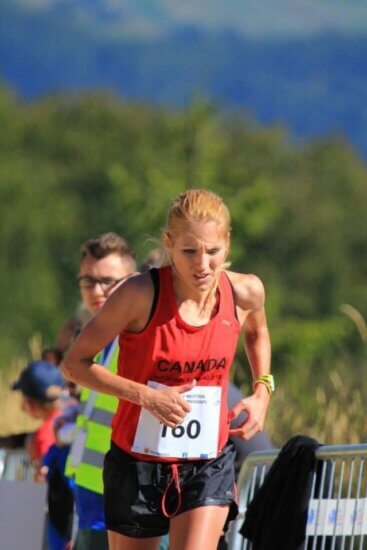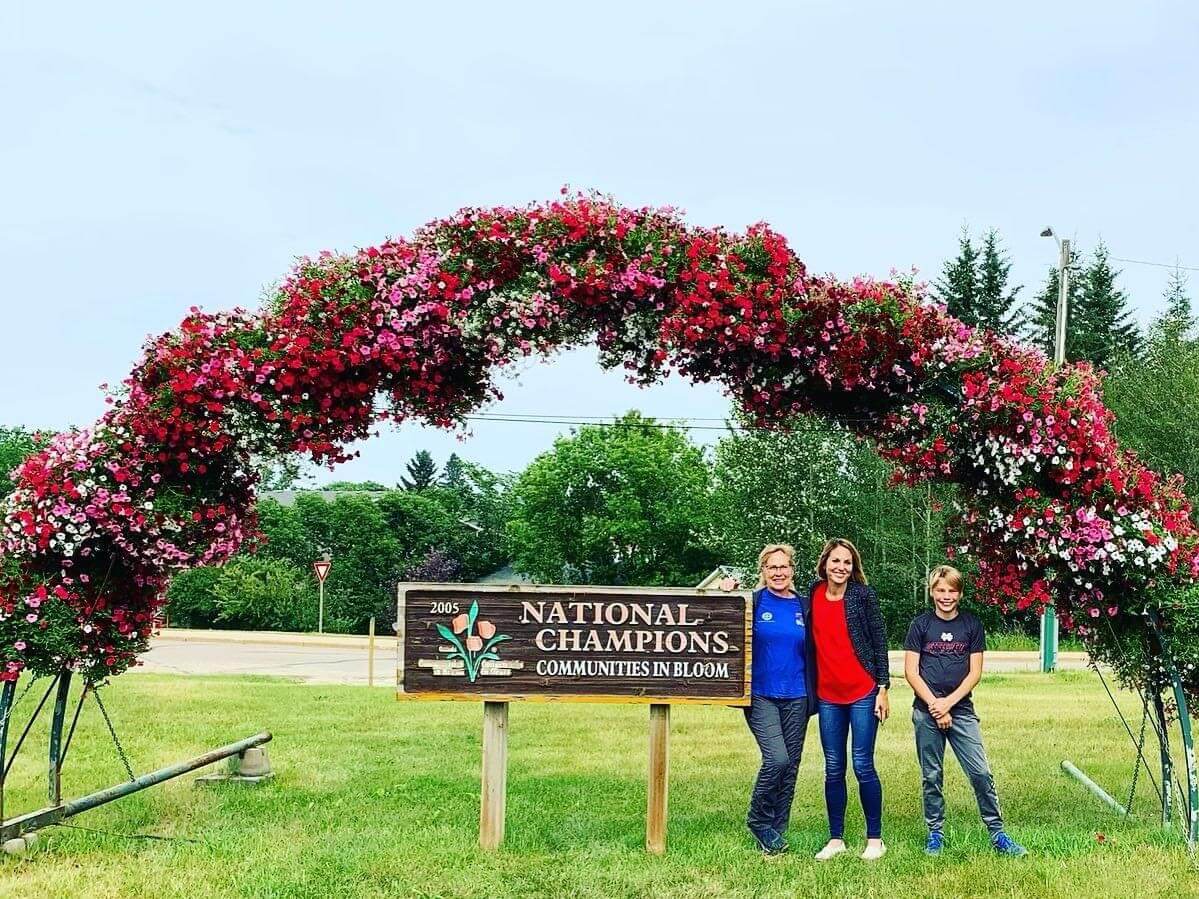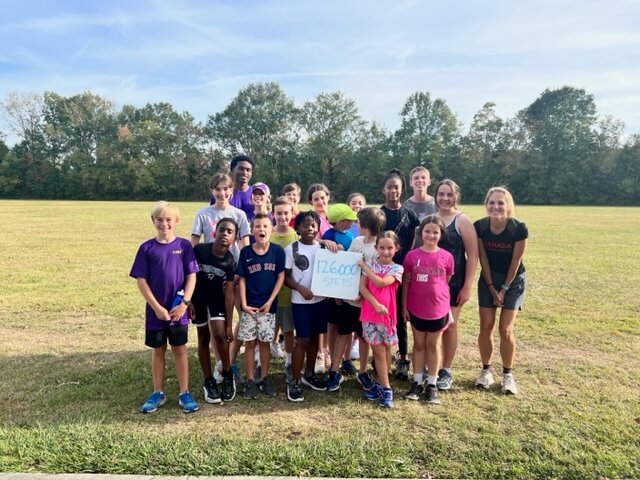Athabasca-born Dr. Meggan Franks comes full circle with doctorate from her hometown university
In Athabasca County, about five miles north of the nine-mile corner, Meggan Franks ran.
She ran down to the Athabasca River and back on her family's property—where her mom still owns and operates Birch Meadow Greenhouses. Other times she would run on the gravel roads around Island Lake. She would run through the Muskeg Creek trail system in the town of Athabasca during gym class, which was one of the only classes she excelled in.
She ran barefoot, feeling the mud and grass between her toes. She would run past the spruce, poplar, and wild rose bushes found throughout northern Alberta's boreal forest. She would run past squirrels and deer—or even the occasional black bear.
"We were country kids, just always outside," she said. "It was so freeing to just get out in the bush and get dirty."
Franks (Doctor of Business Administration '24) was not the greatest student from an academic perspective; she didn't thrive in a traditional classroom. She did better when she was outside in gym class or doing hands-on learning with the local 4-H group in Athabasca.
But decades later, that little girl has earned the right to walk across the convocation stage as Dr. Meggan Franks, achieving the highest level of education thanks to the flexible, customized education she found at Athabasca University.
Running toward a career

After graduating high school, Franks still excelled at running, whether on the track or on the trails. This carried her to Mississippi State University (MSU) on a track scholarship, where she earned an undergraduate degree in apparel, textiles and merchandising. She was interested in the progression of women's uniforms in sport—for a long time, female gear was just the male version with a shortened crotch.
"Nothing fit, and we were constantly wearing clothes that were not designed for our bodies," she said.
But when she finished her degree and got a marketing job for a retail store, she realized she wasn't fulfilling her goal of changing the world. She returned to Mississippi State and completed a master of business administration (MBA).
While working in the MBA office as a graduate student, a professor was impressed with the organizational work she was doing and suggested she apply for an open position at the university in the office of student leadership and community engagement.
It was in this role that Franks was really able to start to make a mark on the world, and on the organization, building an impressive centre from nothing.
"They gave me a binder with two sheets of paper, and said, 'Meggan, you're going to build a volunteer centre,'" she said. "'Thousands of students are going to volunteer through the centre, but you only have one community partner, and you don't have any volunteers yet. Good luck!'"
By the time she left, nearly a decade later, a total of 7,000 students per year would take part in the Maroon Volunteer Center's volunteer programs—9,000 per year if you also include the centre's leadership programs.
At Athabasca University you're in control of your learning, and you get what you put into it. I was so immersed in it. This is the way learning should be for me.
Dr. Meggan Franks (Doctor of Business Administration '24)
Developing a passion for volunteerism
Building and working in the office of student leadership and community engagement at MSU sparked Franks's interest in volunteerism from both a personal and a professional perspective.
She recalls the influence of her parents, who she said are both "really giving people," and also how many others had a positive impact on her life in volunteer or other unpaid roles. These experiences contributed to her deep-seated desire to want to change the world for the better.
Moving to the Southern U.S. and working in some of the lowest-income communities in the country confirmed the value of volunteerism. She watched people help each other, and in doing so, uplift entire communities, and was transformed.
"I felt like I just need to be a part of this, because this is what makes our world better and makes our communities thrive," she said. "It's something I became really passionate about."

Striving to understand volunteer retention
In becoming more involved with the volunteer world, Franks said her academic expertise also came into play as she saw that some organizations were more successful in keeping and growing their volunteer base than others. This inspired her and she started developing the questions that would inform her doctoral thesis in AU's DBA program.
"I wanted to study why these organizations were thriving in capturing volunteers, then these others were just failing miserably," she said. "I thought somebody's got to study this."
Around the same time , she was given the opportunity to take on a role as the volunteer and leadership development specialist with 4-H in neighbouring Louisiana.
In 2019, she and her young family moved to Baton Rouge. She began a role with Louisiana State University, where she provided leadership and oversight for the state-wide Louisiana 4‑H volunteer development program.
I wanted to study why these organizations were thriving in capturing volunteers, then these others were just failing miserably. I thought somebody's got to study this.
Dr. Meggan Franks
Hometown girl rediscovers Athabasca University
Franks still wanted to get a doctoral degree to explore research into organizational volunteerism, but felt like nothing was the right fit. She had a specific idea of what she wanted to study, and also knew she needed a flexible program to fit into her work and family commitments. She found what she was looking for in her hometown university.
"It was not a traditional in-class experience, which I've learned never fit for me. I need to be in charge of my learning, how I learn, and the things I'm studying," she said. "At Athabasca University you're in control of your learning, and you get what you put into it. I was so immersed in it. This is the way learning should be for me."
She thrived in this environment, even winning AU's 2024 Three-Minute Thesis (3MT) competition and earning the right to represent the university at the Western Regional 3MT in Kelowna, B.C. She said the highlight of that experience was learning how to better communicate her research work to a non-expert audience, but she also appreciated having the chance to visit her family with a trip back to her hometown.

DBA grad never stopped running
Franks has never really stopped running, even though she has stepped back from the high-level competitive running that has taken her all around North America and the world.
She runs toward new experiences and adventures, and she runs toward her goals with everything she has. She also runs simply for the pure joy of it and shares that passion with the 50 or more youth who run with her through a 4-H running club she founded in the Baton Rouge area.
While working on her DBA, she would even use an app that would read her academic material to her so she could listen to it while she ran—a customized approach to studying she said would be difficult at a more traditional university.
These days, Franks still likes to run on the trails through the woods. She has traded the spruce and poplar of the boreal forest for the live oaks and cypress of Louisiana's swamps and bayous. There is even a lot of similar wildlife in the area, but her strangest encounter was with something you'd never see in Alberta.
"I was in the city refuge riding and I just stopped to drink out of my water bottle," she said. "I looked to the side and there's like this dang gator right there."